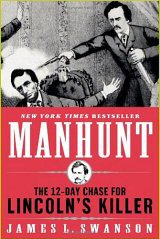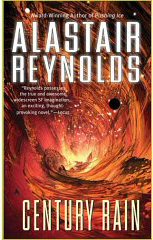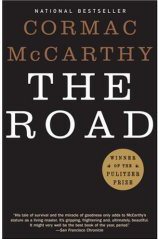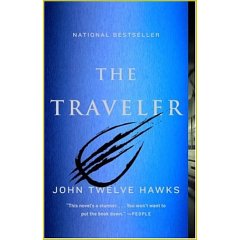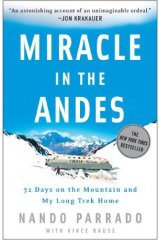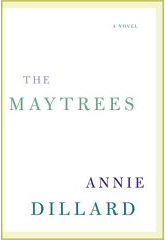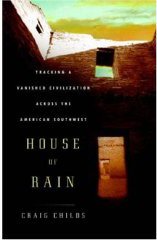Date
Title
Comments
12/30/2007-01/03/2008
01/03/2008 - 01/05/2008
This was an excellent bit of historical writing. Taking a bit more liberty than a normal history, Swanson describes scenery and recounts circumstances as almost as if he was an eyewitness. These don't seem contrived or feel akward but are more of a stylistic element that you don't normally see in history books that are objective and analytical (and can often in an unskilled writers hands be dull and boring). Swanson has no issues with boring, he does a great job of building suspense and intrigue. Everyone knows Lincoln was shot in the head in Ford's theater, but there are so many details about event that I didn't know. Revealing those and the chase for Booth made this a thrilling read. Highly reccomended.
01/05/2008 - 01/15/2008
I am always looking for interesting sci fi. I always find it interesting how Sci Fi novels often seem to take a mystery theme to frame their stories. I suppose that some compelling hook is required to engage the reader, I just find it interesting that mystery is chosen so often. Anyway in a setting of a far off future, when the earth is cold and humankind lives in space cohabitating and competing with a nano-enhanced group of humans known as the slashers, the story focuses on an issue of political intrigue involving a story of 1959 France. I enjoyed Reynolds capabilities as a writer both in the world he created, the characters that inhabited them and the mystery he unravels.
01/16/2008 - 1/21/2008
This book is haunting. Evocative. As you read it will invade your dreams. I hope it stays with me. It is simple in its style, and yet powerful. A masterpiece. In my top 10 for sure, maybe my top 5. Highly reccomended.
01/21/2008 - 1/29/2008
I can't remember where I ended up buying this book from, was either online or at Barnes and Noble. Well after The Road, I wanted something a little more in the thriller vein. About half way through I was complaining to Stac that I was having to plod through the book. I found the style and dialogue a bit ameturish, and the story was a bit odd in that it was both very "nowish", while at the same time an odd mix of sci-fi and fantasy with new age pop and return-to-earthism, and it didn't seem to admit that it was any of these things. Then in my rush to finish, I strangely found that the last third of the book drew me in, as the tension ratched and the fantasy aspects expanded I got hooked and I finished it off with a bang. I am strangely mixed at the end, not sure if I really liked it and if it was really worth it, but I think I'll give book two The Dark River a try.
01/29/2008 - 2/3/08
I had read Alive, and was surprised to see another book on the same subject, but I guess this is a first person account. I heard great reviews of it on NPR and so I picked up a copy. After finishing it I was rivited by the personal story of struggle that Nando recounted, and his message : take nothing for granted, savor each breath of life and live each moment to the fullest. What wonderful words and inspiring story.
02/04/2008 - 2/27/08
I first learned of Annie Dillard when I heard her speak at BYU; she spoke about her book Pilgrim at Tinker Creek and the experiences of individuals who had been blind from birth and were in their mid-life's able to have their sight restored. She spoke beautifully about the visually cognitive wakening they experienced. The new wonder at seeing the world for the first time, how the tree was alive with light and how depth perception was a learned perception. She wrote about this in one of her books that I purchased and have never read. Since then I have bought several other of her books, again putting them on my shelf and never reading them. (Though I did read a few chapters of The Writing Life). So I was determined this would be a Dillard book that I read.
The frame of the story follows the life of the Maytrees a couple who live in post-war Provincetown, Massachusetts. The thematic elements are all the classics : love, marriage, birth, sin, forgiveness and growing old and death. Dillard has a message laden in all of this, which I'll leave you to divine for yourself, however for me the journey through the verbal landscape was almost more important than the message.
The Maytrees is almost like a novel length poem. Each paragraph is full of exquisite phrasing, poetry lies around on every page. I am not sure if she set out with a story line and then poetically wrote the tales and transitions or if she had no idea where she was going and as the poetry flowed she found where she was going and ended up. Either way it was a delight to read. I underlined so many enjoyable phrases that were beautiful in their construction, and like all good poetry were full of not only literally meaning but feeling and emotion and open to interpretation. Others were witty and insightful. Some examples:
Awareness was a braided river. It slid down time in drops or torrents
The silence of permanence lay on the scene
old people claim to have been once young. It is as if they don't belief it. That old people were old never jarred her, but it shook the daylights out of them
With those blows she opened her days like a pinata.
Its not a fast read, poetry never is and requires silence and concentration, but its well worth it for all it gives back.
02/27/2008 - 3/16/08
Mayflower : A Story of Courage,
Community, and War
by Nathaniel Philbrick
I first read Philbrick's In the Heart of the Sea, which like Mayflower is a eruditely researched history, albeit popular history, which is popular not because of its lack of academic rigor as much as its accessible and readable style. I loved Mayflower for the detailed re-telling of an iconic period in the birth of our nation. There was so much about this story that I didn't know, and like most episodes in our survey histories, what is given a couple of paragraphs has such richer detail and fascinating incidents. Some of the elements that surprised me :
- I had somehow in my mind conflated the pilgrims at Plymouth with Jamestown, John Smith and Pocahontas. I need to go back and do more reading about Jamestown.
- The fact that that so many western people had been visiting New England for well over a hundred years, fishing mostly but also trading with coastal tribes. While no permanent settlements were made the contact was pervasive at least on the coastal periphery. For example when the Mayflower landed they ran across a settlement with an iron pot.
- One factor that contributed to the success of the colony was the fact that the plague of 1619-1620 had decimated so many of the coastal Indians just before the Mayflowers arrival. They found the coast empty.
- The advanced agricultural civilization of the American Indians. The settlers from the Mayflower survived their first winter on caches of corn that they "stole" from abandoned villages.
- The diversity of the many many many tribes who have completely from history. The fact that they had no written language and their artifacts were all temporal contributes to this disappearance.
Much of the story centers on the early peace that Plymouth and the rapidly settled New England enjoyed for the first 50 years; and how population growth led to friction and an all out war of attrition : King Phillips War. In the course of 2 years 8% of New England population was killed (in WW2 the US lost just under 1%) where as the Native American population sustained losses between 60 and 80%. And the conflict was bloody, on both sides. Chopping off heads and displaying them on the town's palisades walls was a common occurrence. And nearly a 1000 of the captured tribes were sold as slaves to the Caribbean. Both sides were guilty of atrocities, but this nation was born of blood to be sure.
I really enjoyed this book, well written readable history with great insights into early events that are often told more of myth than truth.
03/17/2008 - 3/29/2008
Sci Fi set in its own era decoupled from a notion of any present time line. Thousands of years have gone by but change while dramatic technological has not been all that dramatic otherwise. A mystery surrounds the disspearance of a ship the Polaris years ago. An antiques dealer and his assistant set out to unravel why and risk getting killed along the way.
03/30/2008 - 4/16/2008
House of
Rain:
Tracking a Vanished Civilization
Across the American Southwest
by Craig
Childs
I think I saw a reference to this book in Outdoor magazine. I picked it up from Amazon and started it the week before we left on vacation to Southern Utah. This was a perfect re-introduction to the essence of the southwest. Beautifuly written with dripping prose and poetry, the book is more a poetic expose on the subject vs. a dry (no pun intended) historical narrative. I loved the descriptions of the wild places that Childs wandered in, finding the clues to the migrations and evolution of the Anasazi (or Ancestral Pueblian). I absolutely must visit Chaco Canyon now and look forward to another visit to the 4 corners area.
My one critique is that a nice set of maps would have helped follow the story.
04/16/2008 -
Desert
Solitaire : A Season in the Wilderness
by Edward
Abbey
Somehow I have made it through 40 years of life and never read this book, after spending time in the desert I set about rectifying this by purchasing this while on vacation and starting to read.

